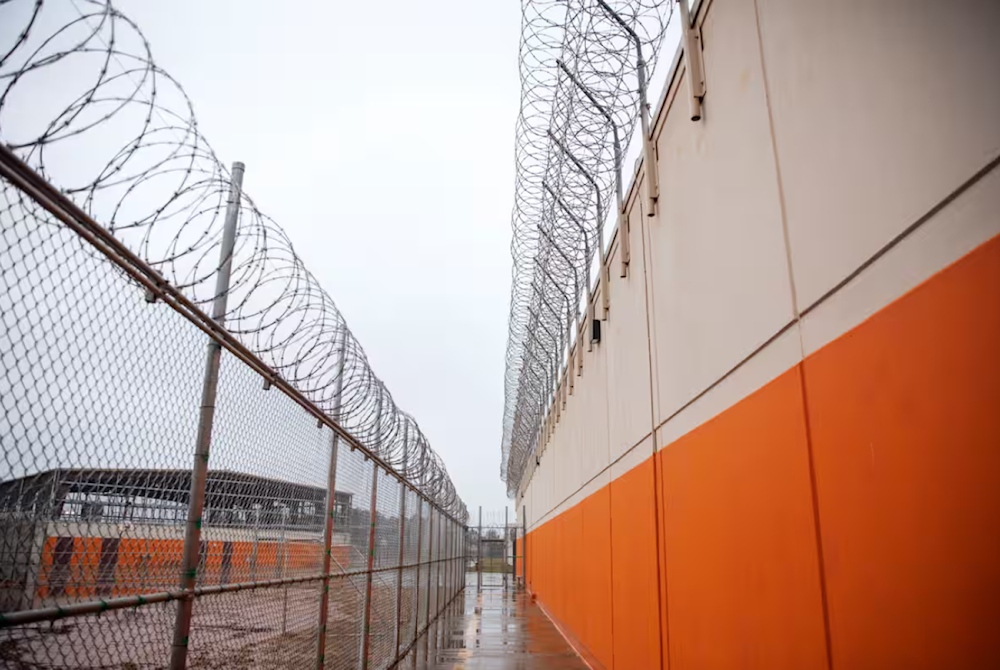Locked in pain: Disabled immigrants' struggle in detention centers
The absence of two federal offices that previously provided oversight for healthcare and other issues has created a situation where detainees with disabilities are increasingly at risk of severe consequences.
-

The Stewart detention center in Lumpkin, Georgia (Undated, AP)
Rodney Taylor, a 46-year-old double amputee from Liberia, has been detained at the Stewart Detention Center in Georgia for three months. Despite living in the US for most of his life, working as a barber and being active in cancer awareness, his immigration status remains unresolved.
Taylor, whose green card application is pending, was detained by ICE in January due to a burglary conviction he received as a teenager, which was pardoned by Georgia in 2010. During his detention, he faced neglect, including missing meals and medical care, and suffered from worsening health issues.
His case highlights the plight of countless individuals with disabilities and severe health conditions who are being caught up in the current administration's "mass deportation" efforts. These efforts are taking place in overcrowded detention centers like Stewart, which are among more than a hundred such facilities nationwide, The Guardian revealed.
'Walking on concrete'
The absence of two federal offices that previously provided oversight for healthcare and other issues has created a situation where detainees with disabilities, like Rodney Taylor, are increasingly at risk of severe consequences, including life-altering conditions and even death. Experts warn that this lack of oversight, combined with overcrowding, creates a "perfect storm" for negligence and abuses.
Joseph Nwadiuko, a professor at the University of Pennsylvania, highlights that deaths are becoming more likely, and the healthcare implications of the current system have not been properly addressed. The immigration detention system was already unsafe for detainees with disabilities, according to experts and former Department of Homeland Security employees.
Sarah Owings, Taylor's attorney, described the situation as unfolding "in the dark" for her client and others. While detained, Taylor, who was just days away from receiving new prosthetic legs, was instead given ill-fitting shoes in what felt like "walking on concrete."
Rodney Taylor's prosthetic legs require eight hours of daily charging, but after being detained at Stewart, he has not been able to receive proper care. The facility only allowed a few hours of charging at a time, causing the batteries to die and the legs to stop bending, which worsened his hip pain.
Meals delayed; wheelchair use hindered
Despite requesting medical leave to see a doctor and get fitted for new prosthetics, his petition was denied, and a second one is still under review. In the meantime, walking to the cafeteria has become too painful, and while other detainees tried to bring him meals, they often had to argue with guards for permission, with a case manager sometimes bringing food an hour late.
Staff at Stewart offered Rodney Taylor a wheelchair, but he can't use it effectively due to his limited hand mobility and a swollen thumb.
After his case was featured in a CNN story about people facing deportation after decades in the US, the warden approached him, asking what he needed. Taylor reported that a guard told him, “Unless you’re dying or bleeding out… they’re not going to come,” reflecting the facility's focus on deportation rather than medical care.
A mess; ICE detention facilities across US
Experts told The Guardian that the situation at ICE detention facilities is similar across the country, including at Krome in Miami, Florida, where at least three detainees have died recently and others with conditions like HIV have gone without medication for weeks.
Amy Zeidan, an emergency medicine professor at Emory University, explained that overcrowding exacerbates an already existing workforce shortage, leaving detention centers without enough qualified staff to provide proper care.
Conditions 'emblematic of the system' under Trump administration
A Department of Homeland Security (DHS) employee, speaking anonymously to avoid retaliation, described these conditions as "emblematic of the system" under the current administration.
Michelle Brané, the former ombudsman at the Office of the Immigration Detention Ombudsman (OIDO), expressed concern over the shutdown of the office, which previously conducted inspections, handled complaints, and made policy recommendations to improve detention conditions, including healthcare. Brané noted that the office played a crucial role in de-escalating situations, which are now being worsened by increasing detentions.
However, the Department of Homeland Security (DHS) argued that these offices obstructed immigration enforcement and created bureaucratic hurdles. Brané criticized this stance as showing a "disdain for meeting basic humane conditions" and emphasized that the OIDO was established by law and funded by Congress.
She expressed fear that detainees, especially those with disabilities or serious health issues, could suffer irreparable harm or even die, urging that death should not be the point at which the system starts caring.

 5 Min Read
5 Min Read









